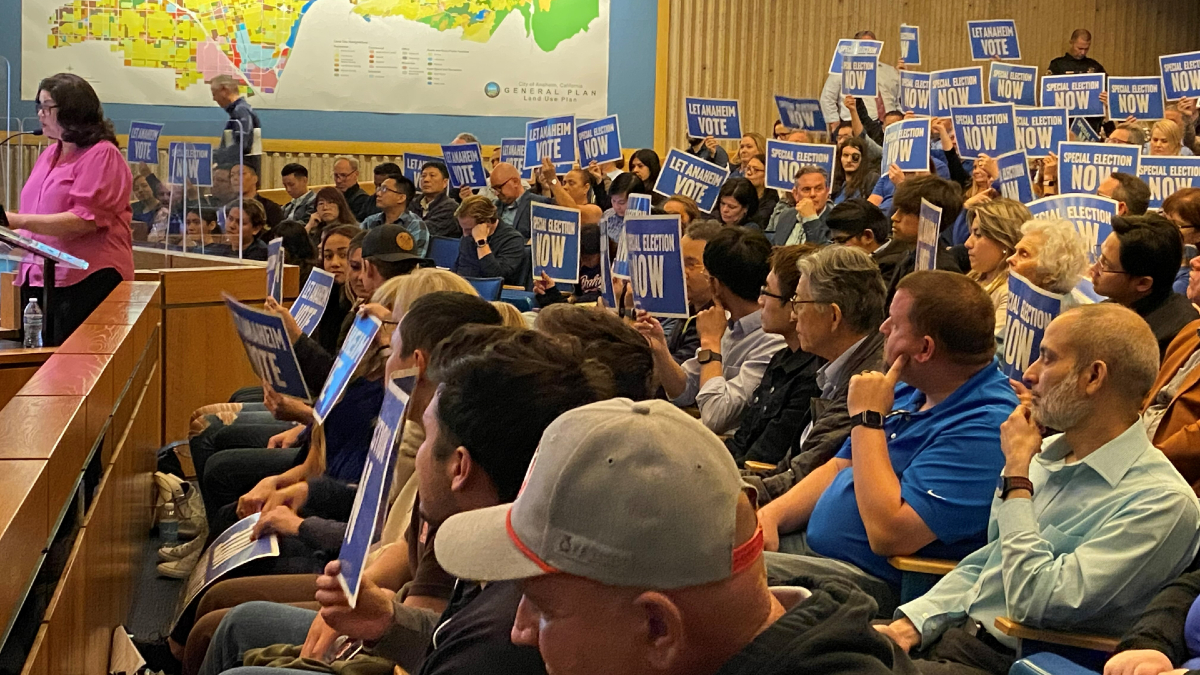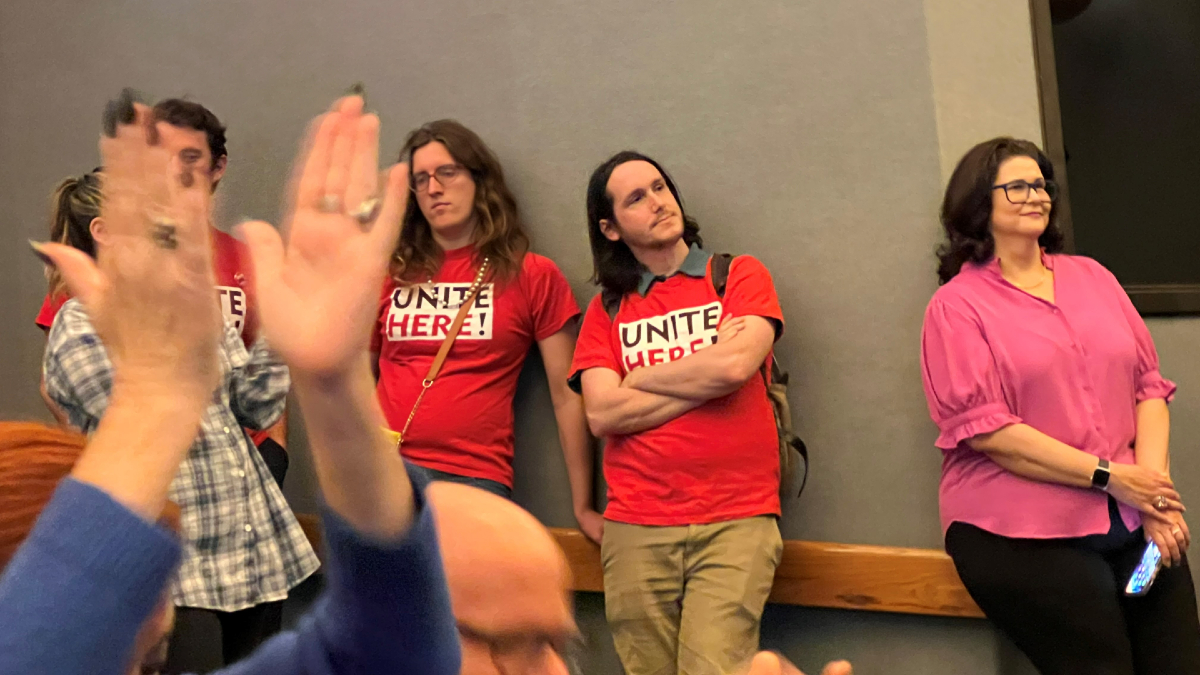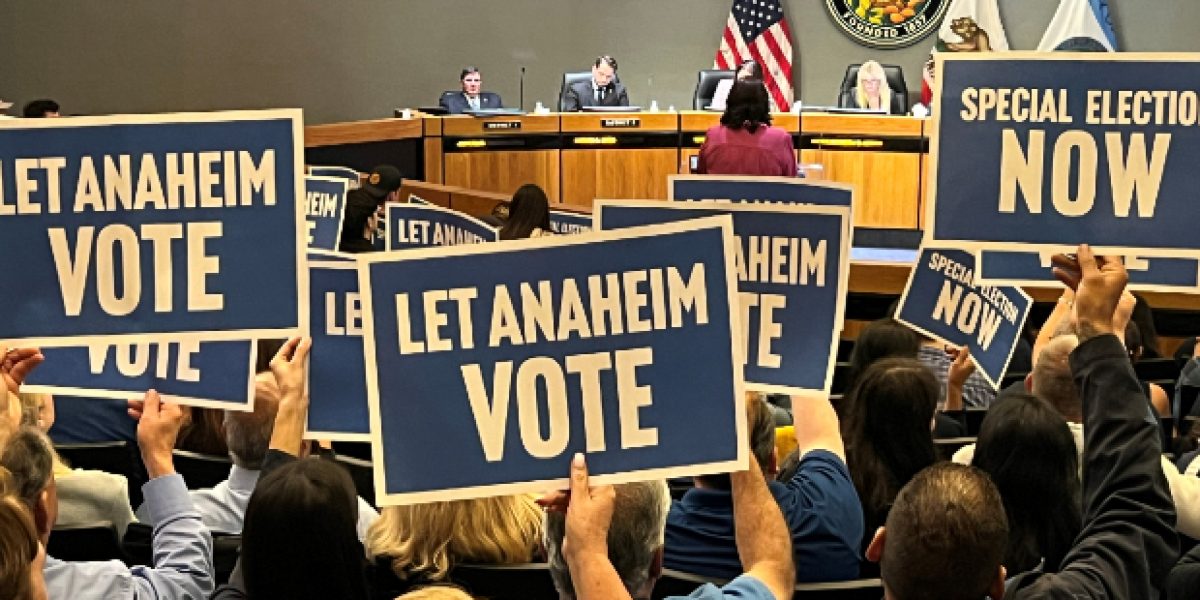Anaheim voters will weigh in this September on a union-sponsored ballot measure that experts predict will reduce city tax revenues and increase the cost of city operations by tens of millions of dollars. The Anaheim City Council voted 5-2 to put it before voters in a September 12 special election, rather than delaying the matter a year and a half until the November 2024 ballot.
The ballot measure is the handiwork of UNITE-HERE Local 11, a militant hotel workers union that represents primarily housekeepers at five Anaheim hotels. While the union bills it as a “worker protection” measure, the principal provisions mandate a $25 minimum wage and a dramatic reduction in how many rooms housekeepers can clean before that wage doubles to $50 an hour.
The work rules are incredibly complex, and the ballot measure grants workers to right to sue employers for compliance violations. It would apply to all hotels and event centers (as defined) in Anaheim.
Experts: Anaheim Budget Will Take A Massive Hit If Initiative Passes
The council commissioned two reports on how the union ballot measure would impact city finances, the Anaheim Convention Center, and the Resort economy.
One study conservatively estimates passage of the initiative would increase the city-owned Anaheim Convention Center’s operating costs by nearly $9 million a year and immediately impact the city’s budget – especially city-owned venues such as the Anaheim Convention Center and Angel Stadium. More than 90% of city employees who earn less than $25 an hour work for the Convention Center; passage of the UNITE-HERE measure would balloon the Convention Center’s labor costs by 19%.
“The ACC and other event centers may struggle to raise process and increase revenues to cover these cost increases, especially in the near and medium term, because convention contracts are typically signed years in advance of an event and are based on the overall market for convention hosting services, which is highly price competitive,” according to the study conducted by Baker-Tilly
A study conducted by Beacon Economics predicted passage of the measure would significantly reduce city tax revenues. The study projected an initial, short-term spike in Transient Occupancy Tax (TOT) revenues due to hotels raising room rates in response to having to double or triple their labor costs. However, that spike will be more of a “sugar high,” after which TOT revenues will enter a long-term decline that will deprive the city of millions in TOT revenue that would otherwise be generated.
Other findings of the Beacon study:
- In addition to inflating labor costs, long-term impacts would include decreased profitability of hotels and event centers, decreased development opportunities, decreased productivity of employees, and diminishment of Anaheim’s reputation as a tourism destination.
- Long-term TOT revenue growth – which makes up half the city’s General Fund – will decrease by 30% and 70%. In the next four years alone, the passage of the initiative would result in the city collecting $4 million less in TOT revenue.
- Hotel room occupancy would decline as room rates rose in response to sudden wage increases in the range of 35%, combined with a 50% reduction in housekeeper productivity as the measure’s work rules drastically reduced the number of rooms that could be cleaned before triggering the $50 an hour wage rate.
- This would discourage investment in hotel construction and renovation, equating to millions in lost construction spending.
- Other tax revenue sources, such as sales and use taxes and event center fees, will decline as well as the result of fewer guests in hotels and shorter stays.
- Hotels will inevitably face more financial hardship and will see a decrease in the valuation of their property
- For event centers, the minimum wage increase along with increased regulations will
make it difficult for these centers to increase rates to offset increased operating costs
and still, be able to remain competitive. - To offset the increase in operating costs and wages, hotels and event centers
maybe forced to reduce employee benefits.
The measure’s impact on the city budget could be even more severe, according to testimony given by the city’s long-time finance director, Debbie Moreno.
33% of full-time Anaheim city employees make less than $25 an hour, while 41% overall make less than $30 an hour, according to Moreno, the great majority. 80% of the city’s part-time employees make under $25 an hour.
About 60% of city employees making less than $25 are paid from the General Fund (the Convention Center is a self-funding municipal enterprise).
“We can assume twice that impact from the Convention Center to the general fund,” said Moreno, “In today’s dollars, that would be in the range of $11.1 million to $12.2 million.” Moreno cautioned those numbers don’t take into account the effects of “wage compaction”: the huge minimum wage increase brings those employees close to supervisory compensation levels, necessitating an increase in supervisory pay to maintain a wage differential. Otherwise, it becomes extremely difficult to fill supervisor positions.
“It is likely you could see increases greater than that,” said Moreno.
Moreno estimated the cumulative impact on the city’s finances would be $41 million in lost TOT revenue by Year 10 if the UNITE-HERE ballot measure passes. When you factor in the automatic annual wage increases of either 3% or CPI (whichever is higher) mandated by the measure, the total cost to the city in lost revenue and higher labor costs will be $65.3 to $68 million at the 10-year mark.
Family-Owned Hotels And Their Employees Mobilize in Opposition
There are more than 160 hotels in Anaheim, most of which are independent, family-owned operations with employees who have been with them for years and advancing into management. The sheer breadth of the ballot measure, as well as its costliness and complexity, poses a direct threat to the viability of these businesses, galvanizing them into swift and vigorous pushback that has caught UNITE-HERE off guard and placed t on the defensive.
Dozens of independent hoteliers, their employees, and allied residents and businesses have out-organized the union and packed the city council chambers for the last two meetings. Taking a page from the UNITE-HERE playbook, they arrived at City Hall hours before the council meeting began. By the time union staffers and member, activists showed up, the council chamber was filled with ballot measure opponents.
Coalition of business owners, residents & workers lined up tell #Anaheim City Council how @UNITEHERE11 initiative will be ruinous for their businesses and city revenues. pic.twitter.com/IfmawnFVJt
— OC Independent (@OCIndependent2) June 13, 2023
Local 11 activists milled around outside the council chambers until a TV new camera arrived, causing them to grab picket signs and march around in a circle chanting “Si se puede!”
Inside the council chambers, approximately two dozen hotel owners, and managers spoke during public comments, dispelling myths about the nature of the hotel business in Anaheim and educating council members on the dire threat the UNITE)HERE initiative poses to their ability to stay in business.
“What we do in our business, as a family business, really helps with our employees and helps keep them with us, giving them a lot of benefits that help them lead a fruitful life here – pension plans, parties, holiday bonuses,” said Anthony Badalian, who’s family has owned and operated the Tropicana and Camelot hotels for decades.
“Our business was down for over 400 days during the pandemic – zero revenue coming in. We didn’t lay off one person – they’re all still with us,” said Badalian.
“[The Alamo owners] have treated my family as a member of theirs, and were even kept on payroll during COVID when the hotel had only one room occupied,” said Gadria Patino, an Anaheim resident who works at the family-owned Alamo Inn and Suites in the Anaheim Resort.
“As the daughter of a housekeeper and a houseman, I understand the struggles they face each day. As a manager, I understand the disastrous consequences this measure may have on small businesses like the Alamo, and even the bigger ones like the ones I help manage,” said Patino, who started with the Alamo at 16 and worked her way up into management.
“As a mother of a school-aged child, I worry for our already underfunded schools, parks, and even the YMCA program that my son enjoys. As a resident, I know firsthand how difficult it is to make ends meet especially with the high cost of living,” Patino told the council. “But if the industry is suffering due to lowered occupancy and increased cost, then we get less hours less benefits and less opportunities. Small businesses like the Alamo could potentially shut down.”
Anaheim resident Erika Gomez told the council the independent hotel where she works provides employees with a range of benefits, including a matching 401k plan, medical, dental, and vision coverage, life insurance 100% covered by the hotel, employee incentives, generous time off, holiday parties and paid vacation.
“It is imperative that this terrible measure by UNITE-HERE be thoroughly reviewed by the voters of Anaheim,” said Gomez. “They need to know the devastating effect this measure will bring to Anaheim residents and small business owners such as my hotel property.”
Dora Garcia, a manager at the Grand Legacy Hotel in Anaheim, talked about the philosophy of her mother, a hotel housekeeper for 40 years who is now retired and “living well.”
“She always told me that we have to value the dollar and we have to start from the bottom and move forward,” said Garcia, saying she followed that advice and started as a housekeeper at age 18.
“I worked housekeeping for four years and then I moved up to the front desk,” said Garcia. “And now I’m an assistant manager at the Grand Legacy Hotel.”
“I’m so thankful for the small company that I work for because they’ve shown me how to grow, how to be able to feed my children,” said Garcia. “I have four children. They’re getting educated, they’re also working in the hospitality industry.”
“If this [initiative] moves forward, we’re going to lose a lot,” said Garcia.
Union Frustration At Being Out-Maneuvered
Opponents of UNITE-HERE’s initiative outmaneuvered the union, and Local 11 representatives and allies vented their frustration during public comments.
Ada Briceno, co-president of Local 11, was able to jump the line to get into the council chamber by being escorted in by an aide to the mayor. She assailed scheduling the initiative for a special election as “outrageous, costly and undemocratic” and claimed a special election would “disenfranchise” voters – although every Anaheim voter will receive a ballot in the mail that they can return in person or mail back for free.
Briceno complained about the one-time cost of a special election but was silent on the tens of millions of dollars her initiative will cost Anaheim in lost tax revenues and higher labor costs.
Several independent hoteliers told the council how they treated their employees like family, providing them with good wages, health care, retirement plans, and opportunities for advancement. Several employees of these non-union hotels spoke warmly of their employers and in opposition to the union ballot measure.

Marta Mellon, a housekeeping supervisor at The Anaheim Hotel, talked about how unhappy she had been working at a union hotel.
“I witnessed what it is to work in a hotel with a union,” said Mellon, telling councilmembers unionization made work a “struggle” and that “relationship between management and employees was lost, was a huge loss of revenue and total lack of flexibility and good service to the guests.”
“Hospitality is not a perfect industry by any means. But we try our best to improve the quality of life for workers,” said Gadira Patino, the daughter of immigrant housekeepers. “We don’t need a measure that forces hotels to unionize, especially those that have built a culture a culture of appreciation and teamwork.”
Anaheim resident and hotel employee Gomez expressed concern the language of the ballot measure would lead to unionization.
“The union coming over and to our hotels and taking over the way we manage our properties is going to cause division between staff and management,” warned Erika Gomez. “It will kill the morale we have built throughout the years with our team.”
“The union, when they go knocking on your door, they’re not telling you all the information,” said Dora Garcia. “But when we ask questions of them, they don’t have answers for us.”
Given Local 11’s failure to organize a single Anaheim hotel under her leadership, all this appeared to get under Briceno’s skin.
“This is the only place in the United States that treats all their employees perfectly?” said an exasperated Briceno. “Give me a fucking break!”

Briceno didn’t respond to the studies’ findings that her initiative would cost the city tens of millions of dollars, and she dropped earlier messaging centered around hotel worker safety.
Carolina Mendez from the radical group ChispaOC, complained about hotel owners and employees getting to City Hall before UNITE-HERE, and waving “Let Anaheim Vote” placards – tactics usually employed by unions and progressive groups.
City Council Opts For A Special Election, Citing Need For Clarity And Quick Decision
“We’ve heard a number of times that this is an initiative that has been adopted to in other places,” said Meeks, referring to UNITE-HERE-sponsored ordinances in Irvine, Long Beach, Hollywood, Sacramento and elsewhere. “But it’s different. It’s overly complex. It’s more onerous. It’s got a wage rate that none of the other ones have that even come close to.”
“It’s devastating to the long-term economy of Anaheim,” said Meeks. “So we need to resolve this and not let it drag out for a year and a half and lose those kinds of conventions or investments, upgrades all the other things that I think are at risk on this. I would like to have the election as soon as possible.”
Mayor Aitken favored delaying the vote until the November 2024 election, saying the intervening time was necessary to understand and plan for the economic and budgetary impacts of the measure.
“There’s still a lot of unknowns, wage compaction, the effects on private facilities, nonprofit spaces, churches, the effects on our other bargaining units, and the enforcement mechanisms that we potentially are going to have to deal with in three months,” said Aitken. “And I would like certainty and what our revenue stream is going to look like.”
“I think having time to prepare to gather more data to plan for any potential impacts that are going to benefit the city allows for us to confidently plan for 23-24 fiscal year,” said Aitken.
A month earlier, the mayor voted to immediately adopt the UNITE-HERE Local 11 measure as the law of the city, without any study or knowledge of its economic and budgetary impacts.
“I do believe that voters of Anaheim should be able to focus on what this specific issue would do to the general fund because it would have me for me the concern is that it would have an impact on community services,” said Mayor Pro Tem Natalie Rubalcava.
The vote was 5-2, with Rubalcava and Meeks joined by Councilmembers Jose Diaz, Steve Faessel, and Norma Kurtz Campos in scheduling the ballot measure for a special election.
Mayor Aitken and Councilman Carlos Leon, who favored delaying it until the November 2024 general election, voted in opposition.


